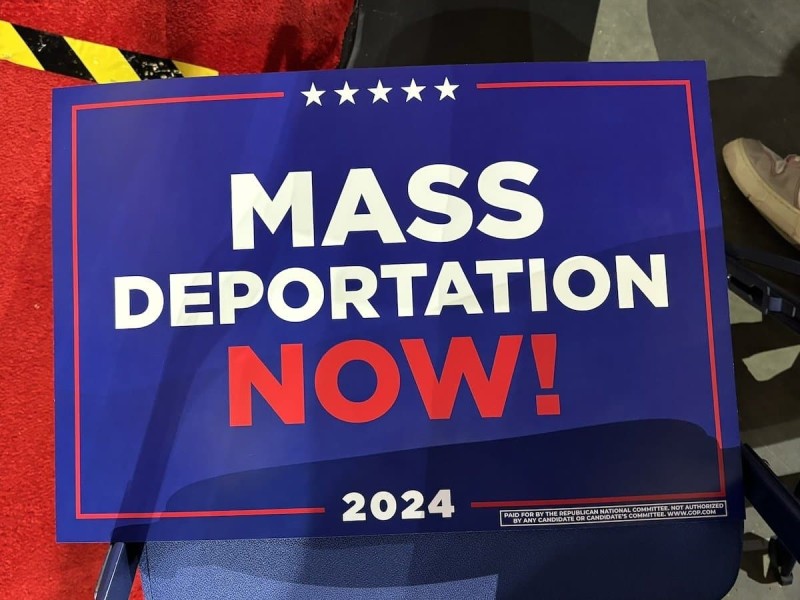Latino Trump Supporters Prioritize Immigration Policies
At a campaign roundtable with Latino supporters in Las Vegas on Saturday, a man who lived illegally in the United States told Republican presidential nominee Donald Trump his immigration story. The man, Elías Trujillo, noted that he is now supporting Trump after initially not fully supporting him in 2016.

Originally published in The Latino Newsletter–reprinted with permission.
At a campaign roundtable with Latino supporters in Las Vegas on Saturday, a man who lived illegally in the United States told Republican presidential nominee Donald Trump his immigration story. The man, Elías Trujillo, noted that he is now supporting Trump after initially not fully supporting him in 2016.
“We came here legally, but you know, we overstayed, and we were able to make life here in the United States,” said Trujillo, who is originally from Northern Mexico and came to this country in 1995.
As The Associated Press reported about the roundtable, “At least one person in the audience began laughing and applauding, leading Trujillo to laugh and acknowledge, ‘It is funny.’ Trump smiled as he looked at Trujillo.”
What Trujillo brought up on Saturday aligns with a new survey by Pew Research Center, which shows that 85% of Latino voters view immigration as one of the top five issues “very important for their vote” in this year’s presidential election. Latino supporters of Trump and Kamala Harris prioritize different issues.
Latino Trump supporters cite immigration as a top issue important to their vote (71%), following the economy (93%) and violent crime (73%). By contrast, only 51% of Latino Harris supporters cited immigration as important for their vote, the second lowest share among the 10 issues included in the survey.
A Long-Standing Trope
Wyatt Browne, who co-leads Princeton Students for Immigrant Empowerment, said he thinks Latino Trump supporters prioritize immigration due to the long-standing trope of immigrants being detrimental to the economy and “stealing what was meant to be yours.”
“Given the economic state of the country and the fact that a lot of people are feeling the squeeze on their finances and are feeling the squeeze on accessing social services,” Browne told The Latino Newsletter. “Maybe for immigrant voters who did things ‘the right way’, that rhetoric holds weight.”
Browne said immigration policy is one of the many large differences between the two candidates, even with Harris’ backtracking on her previous stance of decriminalizing illegal border crossings. He also said it makes sense for voters to prioritize the economy and use it as a frame for their stances on immigration.
“I think immigration is really tightly intertwined with people’s vision of the economy,” he said. “That’s one way immigration will impact the election.”
Latino Harris supporters are also more likely than all Harris supporters to cite immigration as a top issue. Latino Harris supporters cite the economy (80%), health care (78%), and gun policy (66%) as the three top issues impacting their vote.
According to Pew, the results of the survey suggest that preferences of Latino voters in the 2024 presidential election look similar to their preferences in 2020. In 2024, 36.2 million Latinos are eligible to vote, a 4 million increase since 2020.
Patricia Fernández-Kelly, a professor of sociology and director of the Center for Migration and Development at Princeton University, said it is important to point out that the Pew survey asks about people’s views on the importance of immigration, but this captures two types of people. The first is people who believe immigration is too high and should be curtailed, and the second is people who see immigration as good for the country and are concerned about the curtailment of immigration.
“The poll results tell an important story, but it’s not the whole story,” she said.
Democrats and Latino Voters
Earlier in September, Roberto Suro, a professor of journalism and public policy at University of Southern California, told NBC News that Harris’ overall polling with Latinos show she had “righted the ship.”
“Harris has made up most of the ground that Biden lost in the last year,” he said. “But it’s still very much a horse race and she’s not necessarily ahead.”
That ground gained, however, has stayed pretty much the same. After some post-convention bumps, NBC News reported in late September that Latino Democratic support for Harris is at its lowest point in the last four presidential cycles.
Immigrants as Voters
According to the Migration Policy Institute, the number of immigrants in the U.S. as well as their share of the U.S. population have both increased steadily since 1970. In addition, one in 10 eligible voters in the U.S. are naturalized citizens, Pew notes.
Overall support for immigration into the U.S. declined in recent years. A July Gallup poll revealed that 55% of U.S. adults would like to see immigration to the U.S. decrease, the highest percentage since 2001. Although the desire for decreased immigration varies by party, Democrats, Republicans, and Independents are all more likely to favor less immigration. Only 16% of respondents want to see immigration increase, the lowest level since 2009.
Anti-Immigration Immigrants
Fernández-Kelly’s research shows that this anti-immigration sentiment is present even among immigrant populations. The longer an immigrant stays in a country, the more they absorb some of the attitudes of the larger population.
“Older immigrants from anywhere, the longer they have resided in the country, the less sympathetic they are going to be towards more recently-arrived immigrants,” she explained to The Latino Newsletter. “Even fairly recently arrived immigrants don’t want other immigrants, even from their own country.”
This anti-immigrant sentiment comes despite what she described as evidence of a positive effect of immigration on the economy.
“Immigrants tend to be self-selected. They tend to be looking for opportunities for employment,” she said. “Immigrants, even those who are undocumented, pay into the treasury of the United States.”
She added the immigration process in the U.S. is complicated and lacks coordination, and will continue to be a point of contention.
“Immigration is important,” she said. “I highly doubt immigration is going to stop having salience in this country.”




